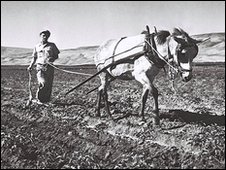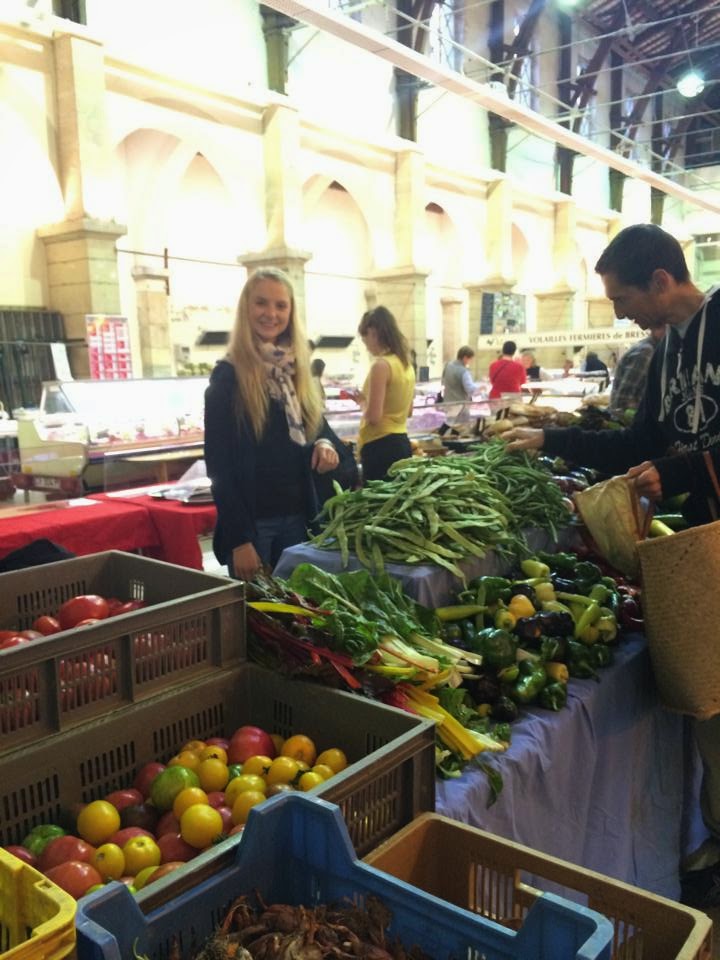 |
| Kibbutz agriculture then |
To get to the Sea of Galilee we drove through the Jordan valley. Knowing that the Jordan valley has very fertile soil and produces a lot of fruit and veg I imagined this somewhat differently. First of all the Jordan does not look like a mythical river. Most of the time it looks like you could almost jump over it. And the landscape it is flowing through is a harsh desert environment, with sun scorched hills on both sides and the fences of the Jordanian border on the left for some of the way. We drove by date plantations and vegetable growing operations, most of them were probably run by Israeli settlements, since Palestinians have only limited access to water.
 |
| and now |
Upon arrival we drove through a gate with a "Private" sign and past industrial cowsheds
and banana plantations that were in contrast with the photos of the horseploughing and circle dancing on the website.
We rented two rooms at the Degania Bet Country Lodge, a two storey building next to the kibbutz kindergarden (that the kibbutzim apparently used to call Hotel California). It was surrounded by small individual houses and some bigger appartement buildings, that were all connected by footpaths and surrounded by well kept up and well irrigated lawns with many ornamental bushes and trees.
 |
| Hotel California |
We had breakfast at the communal dining hall together with other guests and the mostly elder kibbutzniks who choose to still eat there, (my guess is that the majority of inhabitants prefers the privacy of their homes for meals) but we were there as tourists and to get a feel for the place I really wanted to talk to somebody who lived there.
I bumped into Miriam, when looking for my family. She asked me if I was lost. She gave me a ride on the golf cart she was driving (because of her health). She agreed to talk to us about kibbutz life and we met in the afternoon heat. She was born in Mexico, spent part of her childhood in LA and came to Israel and soon afterwards to Degania still a child.
 She is retired now. She worked in the communal laundry, later in the communal kitchen and after that she ran a printing shop at the kibbutz.
She is retired now. She worked in the communal laundry, later in the communal kitchen and after that she ran a printing shop at the kibbutz.Degania Bet is still a community, lots (according to Miriam most) of kibbutzim have been privatised. But Degania is going through changes as well. It has a population of around 500 people. The people living at the kibbutz are either members, that means they can participate in decisions and receive a salary or non-member inhabitants who pay rent for their house and the infrastructure. The members initially gave what they could (in work) and took what they needed. Now there are different levels of salary according to responsibility.
Miriam talked a lot about people who want to join these days, because of the financial safety that it offers. This is certainly a contrast to what attracted early members to join up for a life of hard work, strong community life and no or almost no private property.
 |
| The first day we had the pool to ourselves |
I did get the feeling that the community is aging, that most members are retired, like Miriam. Money is coming in through the kibbutz owned businesses, the dairy farm, the banana and avocado plantations, the silicon factory and tourism. But maybe not many members work there. They employ people from the outside. Like a small mirror image of our aging western societies they have to let in people from the outside to rejuvenate their community but may also be supicious that the people who are coming are mostly attracted by the material comfort that they themselves enjoy and feel entitled to.






























